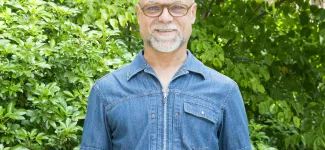Congratulations to Alfredo Ferreira, a lecturer in the science stream of the Academic English Program at Vantage College, on the acceptance of a paper in the prestigious social psychology journal: Mind, Culture and Activity.
The paper, entitled, “Sociocultural development in the spectrum of concrete and abstract ideation,” questions the idea of abstraction as the final goal in the development of higher mental functions.
Drawing on his study of early graduate students’ writing, Ferreira found that while development of writing and associated mental functions did involve increases in the overall level of abstraction, students also have the improved ability to regulate the levels of abstraction in their writing within the context that they were writing in.
The paper also details a novel qualitative and quantitative methodology for tracking levels of abstraction in discourse.
The findings from Ferreira’s study inform his teaching and curriculum at Vantage College. In the Academic English Program at Vantage College, individualized instruction and feedback is emphasized, and student engagement and learning focus on their immediate disciplinary course work as well as their long-term ability to regulate their meaning-making independently.
Ferreira believes that, while students need to develop the capacity to convey abstract ideas, the ultimate indication of success is when students are able to shunt between concrete and abstract ideas as fits their interests in particular disciplinary contexts.
At Vantage College, language instructors in the AEP team identify the nature of disciplinary communication through research and collaboration with the disciplinary instructors in Arts, Science and Applied Science. By these means, AEP instructors are able to identify the expectations in play and unpack these with students, especially in terms of language. With the insights into how disciplinary knowledge is articulated in language, students engage in academic tasks in which they can explore what and how they wish to communicate.
In integrating content and language instruction, the curriculum adopts systemic functional linguistics as the informing theory of language. This framework at Vantage College provides students with a theoretically-integrated vocabulary describing and discussing how we make meaning with language, says Ferreira.
While it can be challenging for anyone to articulate what they mean and, furthermore, describe it systematically, this framework is one that provides students with a broad perspective on disciplinary communication in practice. It’s the specific means for students to better communicate what they mean.
“By teaching students to describe language using language, we’re giving them a permanent resource to construct and deconstruct language,” says Ferreira. “They don’t just learn English. They become disciplinary thinkers.”
Ferreira is passionate about instruction and deconstructing language and embedding teaching and learning into disciplinary learning. His broad interest in academic literacy development in content-integrated English language instruction at the university level began early in his life. Ferreira, who arrived in East Vancouver from Brazil when he was a child, would come home from school and teach English to his mother and her Brazilian friend. These were the humble beginnings of Ferreira’s career in designing and implementing content and language instruction internationally.
Ferreira's career has provided him with a deep appreciation for the transformative work at Vantage College in empowering international students. He helped develop the structure of the AEP curriculum when Vantage was first established six years ago and believes students learn best when they are able to identify the expectations in play for communicating in particular contexts, the meanings they wish to make in those contexts, and the language choices available to them for realizing their meanings.
“This instruction at Vantage College, where there’s collaboration between disciplinary and language instructors, generates so many tools for us to teach students how to unpack disciplinary meanings and what they want to communicate. These resources improve students’ access to the specialized cultures of their chosen disciplines,” says Ferreira.
“Vantage College allows for us as instructors in the program to create a curriculum that is not in line with the status quo. At Vantage, innovations in teaching and learning are an everyday thing.”
